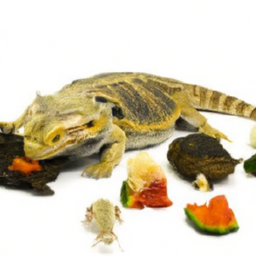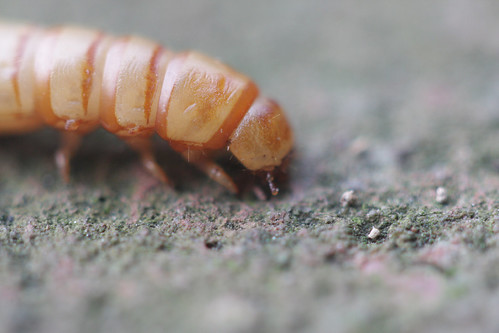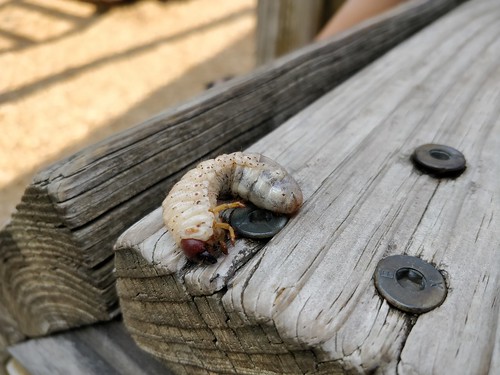Bearded dragons are a unique species of lizard that are omnivores – meaning they eat both plants and animals. A healthy diet for them should be diverse, including live insects, fresh greens and vegetables, as well as the occasional fruit treat.
In this article, you’ll learn about what live food your little budy can enjoy.
What Live Food Can Bearded Dragons Eat?
Bearded dragons are fascinating reptiles that make for popular pets. They have unique dietary requirements that consist of a combination of live insects, plant matter, and occasionally, other small animals.
In this article, we will focus specifically on the live food that bearded dragons can eat and explore the different options available to ensure a balanced and nutritious diet for these reptiles.
Crickets
Crickets are perhaps the most common and widely available live food for bearded dragons. They are an excellent source of protein and can be easily purchased at local pet stores or breed at home.
It is crucial to provide appropriately sized crickets for your bearded dragon, avoiding those that are too large or small. The size of the cricket should be no larger than the space between the dragon’s eyes to prevent choking.
Gut-loading the crickets by feeding them with nutritious foods before serving them to your dragon will ensure they receive optimal nutrition.
Dubia Roaches
Dubia roaches are another popular choice for feeding bearded dragons. They are a nutritious option rich in protein and low in fat.
Dubia roaches also contain a favorable calcium-to-phosphorus ratio, making them an ideal choice for promoting bone health in your dragon. They are readily available for purchase and can also be bred at home, making them a cost-effective option in the long run.
Mealworms
Mealworms are a staple live food for bearded dragons, especially for younger dragons. They are rich in protein and are readily available at most pet stores.
It is crucial to ensure that the mealworms are properly prepared before feeding them to your dragon. This involves gut-loading them with nutritious food and dusting them with calcium supplements to ensure your dragon receives adequate nutrition.
Superworms
Superworms are an excellent live food option, particularly for adult bearded dragons. They are larger than mealworms and provide a good source of protein and fat.
However, it is essential to monitor the size of the superworms, as they can be difficult for younger dragons to digest. Like mealworms, superworms should be gut-loaded and dusted with calcium supplements before feeding.
Phoenix Worms
Phoenix worms, also known as black soldier fly larvae, are becoming increasingly popular as a live food choice for bearded dragons. They are highly nutritious, rich in calcium, and have a favorable calcium-to-phosphorus ratio.
Phoenix worms are suitable for dragons of all ages and sizes, and they do not require any gut-loading or dusting with supplements. They are available for purchase online or at specialty reptile stores.
Silkworms
Silkworms are a nutritious and delicious live food option for bearded dragons. They are highly sought after due to their soft and fleshy texture, making them easy for dragons to eat and digest.
Silkworms are rich in protein and contain essential nutrients. They are particularly beneficial for growing dragons due to their high calcium content.
Butterworms
Butterworms are another live food option that can be added to a bearded dragon’s diet. They are high in fat and protein, making them an excellent choice for dragons that require extra energy.
Butterworms also provide essential vitamins and minerals. While they are not as commonly found as other live food options, they can be purchased online or at select pet stores.
Hornworms
Hormworms are a live food that bearded dragons can enjoy as a treat. They are relatively large and contain high levels of water, making them an excellent way to hydrate your dragon.
Hornworms are rich in protein and low in fat, making them a nutritious and healthy option. However, due to their large size, they should be reserved for larger adult dragons and not offered as a staple food source.
Black Soldier Fly Larvae
Black soldier fly larvae are an excellent alternative to other live food options. They are highly nutritious, packed with protein, and have a favorable calcium-to-phosphorus ratio.
Black soldier fly larvae are suitable for bearded dragons of all ages and sizes, and they do not require any gut-loading or dusting with supplements. They can be purchased online or at specialty reptile stores.
Conclusion
In conclusion, providing a varied and balanced diet is essential for the health and well-being of bearded dragons.
Live food options such as crickets, dubia roaches, mealworms, superworms, phoenix worms, silkworms, butterworms, hornworms, and black soldier fly larvae offer a range of nutritional benefits that help meet the dietary needs of these fascinating reptiles.
Remember to always source your live food from reputable suppliers, properly prepare them through gut-loading and dusting with supplements, and monitor portion sizes to ensure your bearded dragon receives the optimal nutrition it needs.


